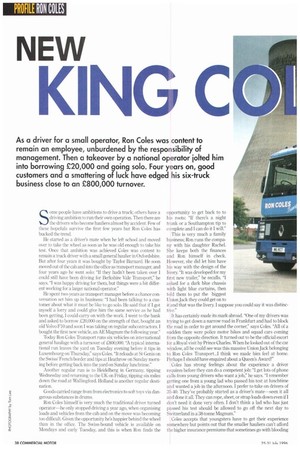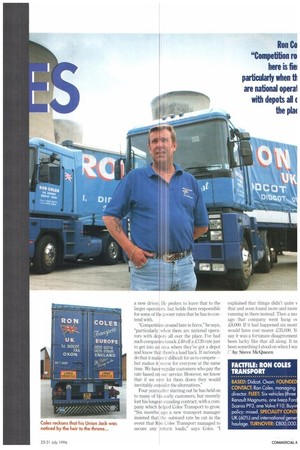NGC
Page 42

Page 43

If you've noticed an error in this article please click here to report it so we can fix it.
S4..Inie people have ambitions to drive a truck; others have a driving ambition to run their own operation. Then there are the drivers who become hauliers almost by accident. Few of these hopefuls survive the first few years but Ron Coles has bucked the trend.
He started as a driver's mate when he left school and moved over to take the wheel as soon as he was old enough to take his test. Once that ambition was achieved Coles was content to remain a truck driver with a small general haulier in Oxfordshire. But after four years it was bought by Taylor Barnard. He soon moved out of the cab and into the office as transport manager, and four years ago he went solo: "If they hadn't been taken over I could still have been driving for Berkshire Vale Transport," he says. "I was happy driving for them, but things were a hit different working for a larger national operator."
He spent two years as transport manager before a chance conversation set him up in business: "1 had been talking to a customer about what it must be like to go solo. He said that if I got myself a lorry and could give him the same service as he had been getting. I could carry on with the work. I went to the bank and asked to borrow £20,000 on the strength of that, bought an old Volvo F10 and soon I was taking on regular subcontractors. I bought the first new vehicle, an AE Magnum the following year."
Today Run Coles Transport runs six vehicles on international general haulage with a turnover of £800,000. "A typical international run leaves the yard on Tuesday evening before it tips in Luxembourg on Thursday," says Coles. "It reloads at St Genis on the Swiss/ French border and tips at I Ieathrow on Sunday morning before getting back into the yard on Sunday lunchtime."
Another regular run is to Heidelberg in Germany, tipping Wednesday and returning to the UK on Friday, tipping six miles down the road at Wallingford. Holland is another regular destination.
Goods carried range from from electronics to soft toys via dangerous substances in drums.
Ron Coles himself is very much the traditional driver turned operator—he only stopped driving a year ago, when organising loads and vehicles from the cab and on the move was becoming too difficult. Given the opportunity he's happier behind the wheel than in the office. The Swiss-bound vehicle is available on Mondays and early Tuesday. and this is when Ron finds the opportunity to get back to to his roots: "If there's a night trunk or a Southampton tip to complete and I can do it I will."
This is very much a family business: Ron runs the company with his daughter Rachel. She keeps both the finances and Ron himself in check. However, she did let him have his way with the design of the livery. "It was developed for my first new trailer," he recalls. "I asked for a dark blue chassis with light blue curtains, then told them to put the biggest Union Jack they could get on to it and that was the livery. I suppose you could say it was distinctive."
It has certainly made its mark abroad. "One of my drivers was trying to get down a narrow road in Frankfurt and had to block the road in order to get around the corner," says Coles. "All of a sudden there were police motor bikes and squad cars coming from the opposite direction. It turned out to be the official escort for a Royal visit by Prince Charles. When he looked out of the car window, all he could see was this massive Union Jack belonging to Ron Coles Transport...I think we made him feel at home. Perhaps I should have enquired about a Queen's Award!"
Coles has strong feelings about the experience a driver requires before they can do a competent job: "I get lots of phone calls front young drivers who want a job," he says. "I remember getting one from a young lad who passed his test at lunchtime and wanted a job in the afternoon. I prefer to take on drivers of 35-40. They've probably started as a driver's mate—seen it all and done it all. They can rope, sheet, or strap loads down even if I don't need it done very often. I don't think a lad who has just passed his test should be allowed to go off the next day to Switzerland in a 38-tonne Magnum."
Coles accepts that youngsters have to get their experience somewhere but points out that the smaller hauliers can't afford the higher insurance premiums that sometimes go with blooding
a new driver. 1k prefers to leave that to the larger operators, but holds them responsible for some of the pi iorer rates that he has to contend with.
"Competition around here is fierce," he says. "particularly when there are national operators with depots all over the place. I've had such companies knock £40 off a £120 rate just to get into an area where they've got a depot and know that there's a load back. If nationals do that it makes it difficult for us to competebut makes it worse for everyone at the same time. We have regular customers who pay the rate based on ourservice. However, we know that if we ever let them down they would inevitably consider the alternatives"
Four years:after starting out he has held on to many of his early customers, but recently lost his longest standing contract, with a company which helped Cols Transport to grow. "Six months ago a new transport manager insisted that the outward rate be cut in the event that Ron Coles Transport managed to secure any return loads," says Coles. "I
explained that things didn't quite v that and soon found more and more running in there instead. Then a mu ago that company went bang 01 18,000. If it had happened six mont would have cost nearer £35,000. Yi say it was a fortunate disagreement been lucky like that all along. It m been something I stood on when I wa:
by Steve McQueen












































































































